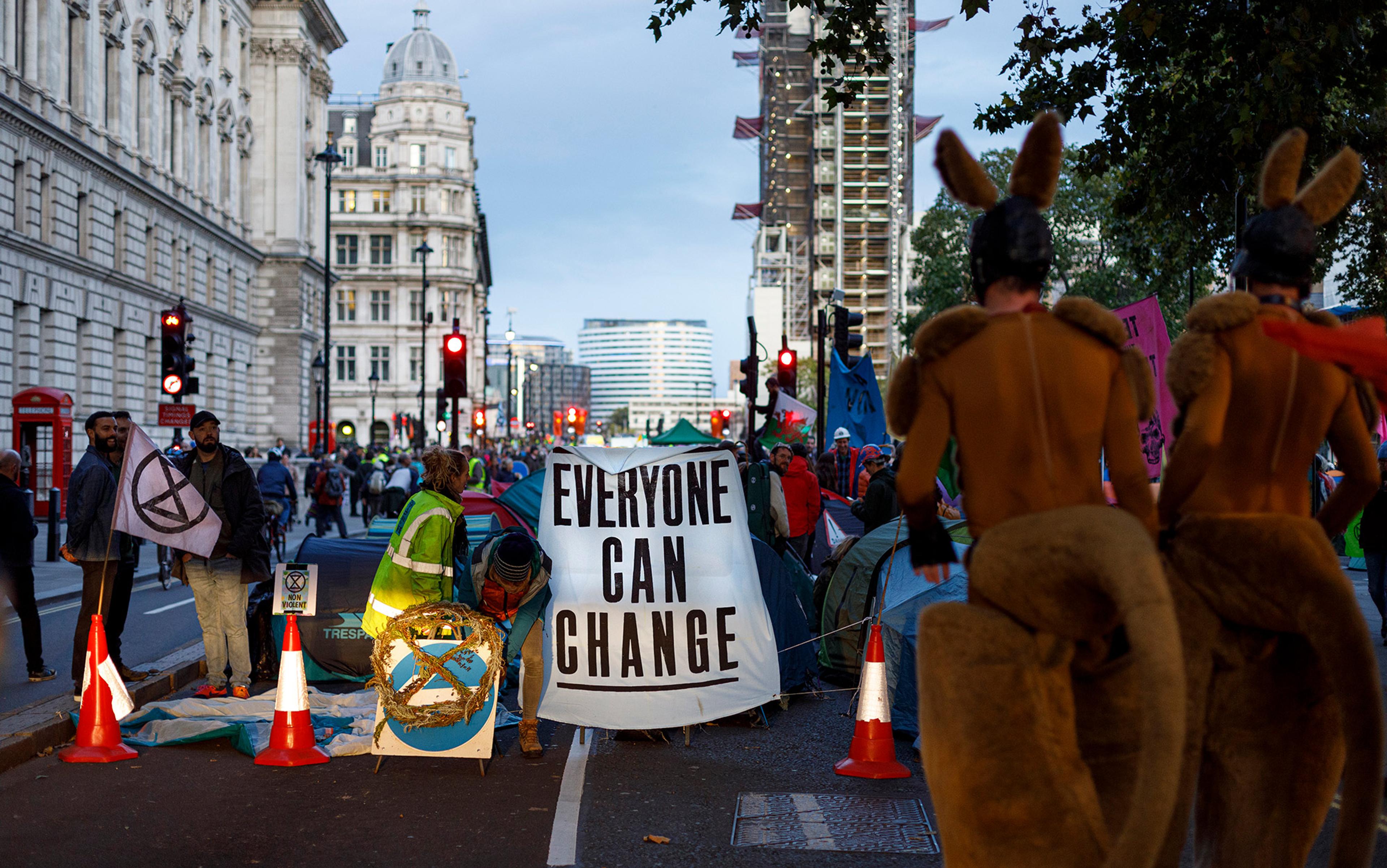For a long time, discourse about climate change was principally about science, and required expert knowledge to assess. Starting in the 1820s, scientists were keen to find out more about the heat of the planet and the variables that would explain its warming and cooling. The French mathematician Jean-Baptiste Joseph Fourier (1768-1830) first hypothesised the effects of the Sun on the Earth’s atmosphere and by implication on its temperatures. Limited by the technological means of his time, he nonetheless set the scene for further discoveries about the causes of variations in temperature – from heat-trapping water vapour (John Tyndall, 1820-93) to carbon-dioxide concentration in the atmosphere (Svante Arrhenius, 1859-1927) – throughout the course of the 19th century.
An entire new field of research expanded the horizon of physicists, chemists and engineers alike. As technology developed, so did scientific experimentation to expand the evidence base of climate research – and, as the field grew, so did the possibility of disagreement that characterises scientific research. By the middle of the previous century, scientists were monitoring CO2 using more precise tools, and they established a baseline that allowed a more accurate assessment of variations. By 1967, the Japanese-born meteorologist Syukuro Manabe (1931-), working in collaboration with his American colleague Richard Wetherald (1936-2011), had created the first computer model that simulated the entire planet’s climate.
Throughout the development of this field, scientific sophistication increased, and with that the complexity of hypotheses and experiments. Talk about climate change was the province of experts, and the concepts of ‘global warming’, ‘greenhouse effect’ or ‘climate change’ were introduced only timidly into the public sphere at that time, entering politics 20 years after the first climate model, with the landmark speech of NASA’s James Hansen to the US Congress in 1988.
Climate change is, of course, a scientific issue. But it is not only a scientific issue. In the context of the expansion of a new field of scientific enquiry, the causes of a changing climate – the rapid increase in concentration of CO2 in the atmosphere due to a proportionately rapid burning of fossil fuels – as well as its effects on the natural and social environments – were becoming better known. The costs and benefits of the practices that caused increases in CO2 concentration, that is, that caused unprecedented increases in global temperatures and disruptions to ecosystems, also became clearer to those with access to this information.
Indeed, given the observed consequences of the rapid rise in global temperatures due to emissions of CO2 from the combustion of fossil fuels for human activities, one might have expected concerted action at the local, national and global levels to regulate emissions and support the building of impacted communities’ resilience. Today, we can very easily see that this hasn’t happened. However, the framing of the issue as pre-eminently scientific stalled efforts of this kind for decades and was, arguably, part of a movement to avoid the regulation of fossil-fuel extraction and combustion.
In Hansen’s pivotal 1988 testimony, a renowned scientist competent by all available measures shared his knowledge with representatives of US citizens with a view to informing them about the causes and consequences of a warming climate, and the options for mitigating its impacts and slowing its pace. Indeed, climate science, though complex, was translated in terms accessible to US politicians, driven by the assumption that collective climate action needs to be made at the political level. Acknowledging that climate science is complex and needs translation, this testimony also aimed to bridge the gap between expert climate knowledge and political will-formation.
And yet, since that turning point in 1988, the debate about climate change has largely remained focused on science at the cost of bringing to the fore issues about collective climate action. What is more, this focus on the scientific issues has specifically taken the character of skepticism and debate about human-caused climate change, with the result of stalling urgent action to reduce emissions and to build resilience against impacts that are already observed.
In their book Merchants of Doubt (2010) – and the 2014 documentary of the same name – the US historians of science Naomi Oreskes and Erik Conway show how companies with interests in delaying collective action to curb climate change framed the debate as one of science, technical expertise and information. These companies used covert tactics, such as funding established scientists, to flood the discourse with claims about scientific disagreement on climate change. Of course, climate change is a scientific issue and it is paramount to address it accordingly; but it is also a political issue – and should also be addressed as such. The consequence of this framing of the debate has been to convince many citizens that climate change is too technical a topic for them. By casting doubt on what is in fact a consensual scientific issue – namely that climate change is human-made and requires a global response to reduce greenhouse gas emissions by weaning the economy off fossil fuel-based energy – these ‘merchants of doubt’ have implicitly relied on this distinction between expertise and authority to exclude ordinary citizens from the debate about climate change. Since climate change is not settled, the suggestion is, it would be useless – and perhaps even wrong – for citizens to be politically engaged on the issue.
There is still a strain of disagreement that took root when climate scientists started warning us of the dangers
The misleading practices of companies and individuals described by Oreskes and Conway are usually interpreted somewhat differently. Indeed, climate denialism is more often seen as a ‘war on science’ and a denial that science has the power to explain the variations in climate events or their causes. This does seem to be one of the consequences of climate denialism. What I am suggesting here, however, is that framing questions about climate change as exclusively scientific is one way to steer democratic decision-making away from any collective action to address rising temperatures and the human practices that cause them. If climate action requires technical competence to arbitrate, then citizens should limit themselves to individual-level climate action, such as using energy-efficient LED lightbulbs, reducing plastic waste, and so on. Only very recently has political – and even electoral – action on climate become more mainstream. As long as climate denialism retained overwhelming power in collective discourse, the scientific threshold of participation prevailed, and politics retreated from meaningful engagement by citizens.
And yet climate change is de facto a political issue. Agreement that climate change is a pressing political issue is now very common: laws are being made to control actions that contribute to it; the increasing awareness of consumers of the ecological impact of their behaviour affects commerce; and the negative effects of fossil fuels are at the origin of considerable amounts of innovative research into alternatives. However, there is still a persistent strain of disagreement – with consequences that either forestall effective action or misconstrue the nature of our obligations, both collective and individual – that took root around the time that climate scientists started warning us of the dangers of its impacts.
And so, while the requirement for scientific and technical expertise about climate change cannot be denied, there are ways to reconcile this reality with the needs for inclusive, democratic processes about climate action. In his theory of deliberative democracy, the German philosopher Jürgen Habermas (1929-) provides a framework within which democratic processes can distinguish between the different dimensions of discourse – scientific-pragmatic and moral-political. In the context of climate change, this means that there are pathways to address the problem that don’t require scientific or technical expertise, and that are geared towards tackling the collective issues it raises democratically.
Habermas’s version of deliberative politics is rooted in his theory of communicative action. There are several reasons for singling out Habermas here. First of all, the spectre of technocratic rule has guided his work since the 1960s. More significantly, however, Habermas has consistently recognised the value of the ‘substantive’ aspect of political decisions, setting him in a tradition of democratic thought concerned with finding the adequate balance between the democratic requirement of equal respect for each citizen and the recognition that the substantive and technical quality of citizens’ contributions varies. Its duality – accepting the necessity of paying attention to the ‘substantive’ aspect of political decisions, as well as taking the democratic requirement of equality not to be expendable – is a promising route to understanding how best to tackle climate change democratically.
The key to unlocking the potential of Habermas’s model lies in his distinctive notion of discourse, and his related theory of discourse ethics. Discourse is a practice in which participants engage when the validity of a claim is at issue. In practical discourse, participants argue in favour or against the validity of claims under specified conditions – as Habermas put it, ‘in ever wider forums before an ever more competent and larger audience, against ever new objections’. Discourse is thus a practice, an ongoing process of justification. Discourse becomes ‘rational’ when it takes place in certain conditions, namely when no one who could be affected by the norms is excluded, when all affected have a voice and are free to put forward objections, and when participants express themselves with sincerity. The only constraint regulating discourse is ‘the unforced force of the better argument’, at the exclusion of any other external constraints such as power or money.
Discourse, for Habermas, is a process of trying to reach agreement in conditions of disagreement. Discourse operates in two distinct ways to confer validity to its norms, most clearly in the context of politics. One way is by constraining the epistemic content of norms. Another way is by highlighting that through discourse participants can achieve the kind of agreement that, even if there remains substantive disagreement, nevertheless carries weight in making a norm legitimately enforceable. This is what Habermas suggests in his ‘Remarks on Discourse Ethics’ in Justification and Application (1993), where he notes that:
both moments – the moment of passivity inscribed in reason and the moment of activity attributable to the will – must be such that they can be related to one another in the concept of a procedural morality … This procedure admits of different characterisations and takes on a different meaning as we highlight one or the other moment of the procedural practice.
How does this help us understand the interplay between science and the need for democratic participation in the case of climate change? According to Habermas, we can distinguish between different modalities of discourse, and assess when they are most appropriate for solving collective issues. Indeed, in Justification and Application, his analysis of practical reason and discourse, he offers a theoretical understanding of discourse as a legitimating force in politics, one that confers moral force and justice to certain decisions. But he also recognises that political decisions are necessarily more specific than a theory can account for, and more context-dependent. Hence political agreement is at once conditional and specific and, as a result, it cannot be subsumed under a single concept of discourse. Habermas’s distinction between types of practical discourse operates as a supplement to his high-level theory of deliberative democracy.
For Habermas, moral and ethical norms are deemed valid through different processes of justification
Among the different modes of reasoning about action, Habermas identifies the pragmatic, the ethical-political, and the moral uses of practical reason. We can answer the question ‘What should [we] do?’ from these different perspectives, and indeed Habermas writes that ‘this “should” remains indeterminate as long as the relevant problem and the aspect under which it is to be addressed have not been more clearly clarified’. The possible aspects are ‘the purposive, the good and the just’, and three kinds of questions correspond to them, respectively, pragmatic questions, ethical-political questions, and moral questions. In Justification and Application, Habermas starts with cases where these questions arise for an individual. However, he carries over the distinction to the collective case – most notably in Between Facts and Norms (1992) – where it resonates in the legal and political dimension.
The validity of norms reached in moral uses of reason is determined by the norm’s capacity to take into account the interests of those affected by it in similar and foreseeable conditions. As Habermas insists:
moral-practical discourse represents the ideal extension of each individual communication community from within. In this forum, only those norms proposed that express a common interest of all affected can win justified assent.
Moral claims are deemed valid to the extent that they satisfy a principle of universalisation, he writes in The Inclusion of the Other (1996):
A norm is valid when the foreseeable consequences and side-effects of its general observance for the interests and value-orientations of each individual could be jointly accepted by all concerned without coercion.
This principle functions as a rule of argumentation by which people judge the validity of moral claims. Moral discourse, however, often yields indeterminate judgments in deciding between two morally acceptable laws; so, lawmakers typically must rely on more than moral arguments in justifying laws.
Moral claims assert universally valid action norms. They are not limited to a specific community or group of people. The moral norm ‘You should not steal’ doesn’t claim to be valid for only some cultures and not others. By contrast, an ethical norm such as ‘Children must not speak unless spoken to’ can claim validity only for a community that has accepted that norm as valid. For Habermas, moral and ethical norms are deemed valid through different processes of justification. Specifically, concerning ethical-political discourse, normative claims are justified if they correspond to an authentic use of discourse. Though the ethical-political use of practical reason is not structured by what in Between Facts and Norms he calls a ‘single right answer’, and though it is not intended to ‘win the assent of a universal audience’, they do contribute to the rational-political character of collective decisions, while keeping open the possibility of change (through the authentic self-reflection of the polity) and of contestation (by the agents of change).
Finally, pragmatic discourse is a form of communication in which participants are looking for the best means of realising a specific end or solving a problem. How to get rid of traffic? How to ensure children remain in school until they are 16? Such questions are the starting point of pragmatic deliberation, the issue of which can be settled in terms of the efficiency of the choices made or in terms of the means (techniques, strategies, programmes and so on) put forward. The relevant norm of validity for the discovery of expedient means is an objective standard, such as truth.
The tension described above regarding the predominance of scientific discourse in the recent history of climate action stems from the ubiquitous tendency to address the problems raised by the increasing temperature of the planet mostly, if not exclusively, from the perspective of ‘pragmatic discourse’. Focusing on the truth or untruth of scientists’ claims about climate change stops us before we can even get to the moral or ethical dimensions of climate change, which would help to reach agreement on collective action to curb it.
Of course, we need to rely on the best science available, and we need to decide what the best course of action is to deal with this variation in temperature and its effects on the ecosystem. However, prioritising this perspective threatens to leave other relevant questions unasked. What confronts us is not merely a technical quandary, which can be solved by resorting to proposals of efficient means, such as using better lightbulbs or reducing our individual use of fossil fuels. The task is also to determine what obligations are incumbent upon whom, to identify responsibility to act, and to ensure that solutions are fair. This requires a discussion that cannot be only about technical proposals. It must also include questions of justice – domestic and international, local and global.
In this case, the principles that are needed to deal with the issue of global warming are obscured by the scientific discussion in terms of efficiency. Though it is changing, this was still a prevalent mode of dealing with the problem in the media until a few years ago, and as a result the process of becoming aware of the relation of global warming to normative questions has been long and arduous. Where a choice of means is concerned, pragmatic normative standards are not sufficient; normative standards associated with the other two aspects of practical reason are called for. Even choosing between efficient means appeals to normative standards beyond efficiency.
Scientific knowledge can be used to legitimate different political positions and decisions
Scientific knowledge is embedded in a political and social context, which lends it a character that could be termed ideological. This is a problem for fair deliberation since science is taken to be neutral. As a matter of fact, there is an increasing tendency in civil society to take science to be the voice of objectivity. But if scientific knowledge used as the basis for pragmatic reasoning is not inherently neutral, it is possible to unearth the more ideological aspects of a given scientific position. This process itself requires complex and sophisticated epistemic, and specifically critical, skills. This makes the interpretation of expert contributions particularly difficult and inaccessible to most laypersons. Expert contributions to deliberation come to be seen as hermetic and fundamentally incomprehensible to lay persons, again violating conditions of fair deliberation. It is this fact about the use of scientific claims in politics that climate denialists have relied upon to prevent us from having a meaningful debate about it.
Scientific knowledge can be used to legitimate different political positions and decisions; it is not one-dimensional, ‘hard’, neutral, value-free or ‘objective’ truth. The relationship between knowledge and decision-making is much more complex. The variety of issues reveals the complexity of this relation. It involves – not exhaustively – issues such as the framing of problems, which kind of knowledge ought to be mustered on a given issue, the degree of consensus that recourse to scientific expertise provides, its possible interpretations, the number of answers it provides, and how that knowledge is linked in any way to interests (in policymaking), since it can be either supportive, contradictory or even dangerous for the latter. Knowledge inevitably comes under these evaluative verdicts once it enters the public arena and is considered politically relevant. That we should stay skeptical that scientific knowledge can remain neutral in the advisory process, that scientists merely deliver ‘objective’ knowledge, is not a new idea – the French philosopher Gaston Bachelard’s dictum that ‘scientific observation is polemical’ captured this very clearly.
But how are we supposed to uncover these workings? For Habermas, it is deliberation alone that can reveal distortions in the application of these discourses, and help us select the best course of action. In deliberation, it is possible to arrive at the resolution of political problems involving the environment that are characterised by the complex interplay between the three aspects of practical rationality – the pragmatic-technical, the ethical-political, and the moral. The distinctions his model makes between the uses of practical reason also make available critical tools for assessing not only our treatment of nature as a means but also the consequences that this relationship has upon the bonds of solidarity and justice that unite human beings.
Once the intricacy of the various modalities of reason that are at play in political problems becomes visible and, importantly, contestable through discourse, the Frankfurt School’s insight that our fate is tied to that of nature descends to street-level, so to speak. Indeed, through deliberation we reach a position whence we can see, not only that ecological questions are also questions of justice, but that it is by seeking political resolutions to such problems through discourse that we might reasonably hope to solve them at all. There is no ‘getting it right’ without ‘getting it fair’, too.






